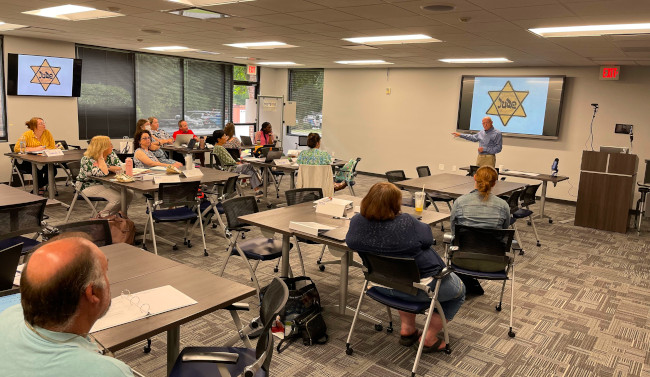The SCCH will be hosting two summer institutes for teachers in 2026! The applications will be made available on this page in January 2026.

2026 SCCH Summer Institutes
I. Foundations of Teaching the Holocaust (June 1 - 5)
II. Resilience, Resistance, and Remembrance: Teaching the Holocaust from the Victim's Perspective (June 22-26)
Key Benefits
- Teachers can earn 3 graduate credit hours from USC for each course and the cost of each course for each teacher will be covered by the SCCH.
- Teachers will receive hands-on training in content, pedagogy, and methodology.
- Additionally, participating teachers will also receive books and resources to use in their classroom.
Course Descriptions
I. Foundations of Teaching the Holocaust
This course is intended for K-12 teachers, and other education stakeholders, seeking increased knowledge of teaching and learning about the Holocaust as well as deepening pedagogical understanding of inquiry based approaches in Holocaust education. During the course, participants will examine what actions were necessary on the part of individuals (ordinary citizens, military officers, teachers, clergy, and so on) to enact and maintain a system that killed millions of Jews and others. The workshop also examines South Carolina-related resources, and different teaching methodologies (i.e., oral testimonies, historical inquiry, literature, and primary sources).
This course is useful for all teachers, most notably for those who are new to teaching the Holocaust and/or those who wish to have a firm understanding of both the context of the event and how to approach teaching it in the classroom.
II. Resilience, Resistance, and Remembrance: Teaching the Holocaust from the Victim's Perspective
The intent of our special topics coursework is to immerse participants in viewing the Holocaust from unique angles that are often less deliberately explored by teachers in order to give them a more nuanced understanding of the Holocaust. This specific course is designed as an advanced study of the Holocaust from the lens of the victim's perspective.
While the participants will engage in learning about the overall context of the Holocaust they will do so with the perspective of the mindset of the victims. Often considerable attention is given to the course of historical events and specifically to what the Nazis were doing as they pushed along the evolution of what came to be known as the Holocaust. In contrast, this course will involve an exploration of how the victims of the Holocaust were experiencing the events as they occurred in the period of 1933 - 1945 and beyond. Specifically, participants will be looking at how the victims were resilient in the face of great adversity, the various ways in which they resisted, and how they and others seek to remember and ensure remembrance of the Holocaust in the decades that followed 1945.
It is important to recognize that participants do not need to have a strong background in Holocaust studies to participate in this course. All levels and subject area teachers will find the content of the course engaging and the lessons taught to be transferable to a wide range of classrooms and students.
This course is open to all K-12 teachers and educational stakeholders. It is highly recommended, but not required, that participants have already taken the Foundations of Teaching the Holocaust course or other related significant coursework in understanding the Holocaust offered by the SCCH or another qualified Holocaust education organization or higher ed institution.
Application Information
All interested applicants can locate more information about the institutes including the application through the following link: 2026 Summer Institutes Application
If you have any questions about the institutes please contact us at education@scholocaustcouncil.org

Every other year, the South Carolina Council on the Holocaust sponsors a trip to Eastern Europe so that educators and the general public can gain a deeper understanding of authentic sites of the Holocaust. The trip concentrates on sites in Poland, including the Memorial Museum at Auschwitz-Birkenau and the neighboring town from which the concentration camp got its name Oswiecim. Participants also visit important places of Jewish culture, such as Kazimierz, the former Jewish quarter of Krakow. Often, the trip adds an additional location to help show the scope of the Holocaust across the European continent. For example, in 2019, the trip included a weekend in Amsterdam with a special visit to the Anne Frank House.
Additionally, the trip is coordinated in conjunction with the University of South Carolina which offers graduate course credit for those teachers who complete required assignments associated with the trip. The costs of these graduate credits are underwritten by the South Carolina Council on the Holocaust.
There will be a trip in the summers of 2023 and 2024.
Trip Costs
The total cost of this unique opportunity is approximately $5000, which includes a 10 day tour, lodging, and graduate university tuition.
To help offset the costs there will be a special funding option: SC-certified educators with current contracts to teach in the state of South Carolina are eligible to apply for a scholarship that would cover a significant portion of the costs of the trip.
More information about the trip, the cost, funding options, and scholarships will be made available through our email listserv each fall of the year before the trip.
If you are interested in thetrip please contact us at education@scholocaustcouncil.org.